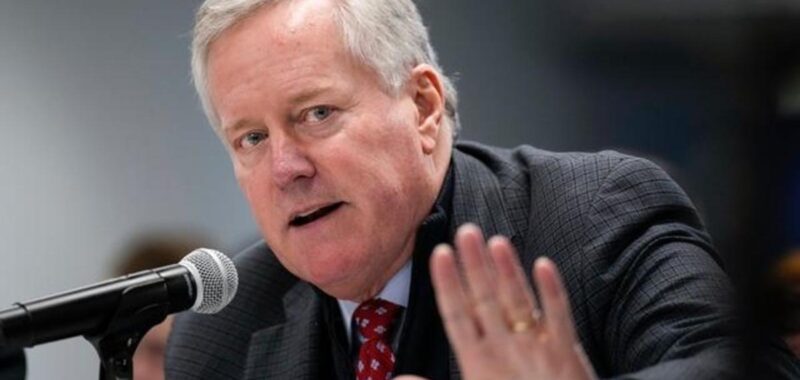Washington — The Supreme Court on Tuesday turned away former White House chief of staff Mark Meadows’ bid to move his state prosecution to federal court in the case stemming from an alleged effort to overturn the results of the 2020 election in Georgia.
The court’s denial of Meadows’ appeal leaves in place a lower court decision that returned the prosecution to state court. Meadows and President-elect Donald Trump, for whom he worked, were charged alongside 17 others by Fulton County prosecutors for their alleged efforts to reverse Trump’s electoral loss in Georgia in 2020.
They pleaded not guilty to all charges. Proceedings have been on hold for months as a Georgia appeals court is set to consider in December whether to allow Fulton County District Attorney Fani Willis to continue prosecuting Trump and his allies.
Meadows served as Trump’s chief of staff from March 2020 to January 2021 and was a prominent figure in the president-elect’s attempts to stay in office for a consecutive term after the November 2020 presidential election.
Two counts were brought against him by Fulton County prosecutors: the first alleges that he engaged in a wide-ranging racketeering conspiracy with Trump, and the second alleges he participated in an effort to solicit a public officer, Secretary of State Brad Raffensperger, to violate his oath of office.
Meadows is portrayed in the indictment returned in August 2023 as a go-between for Trump and others involved in coordinating the strategy for contesting the 2020 election and disrupting the joint session of Congress on Jan. 6, 2021. He participated in a Jan. 2, 2021, phone call between Trump and Raffensperger, during which the then-president asked Raffensperger to “find” 11,780 votes, enough to make him the winner of Georgia’s election.
After Meadows was charged, he sought to transfer the case to federal court under a federal officer removal statute and argued that the actions alleged in the indictment related to his role as chief of staff.
The district court, however, sent the case back to the Fulton County Superior Court. While U.S. District Judge Steve Jones conceded that some of the charged conduct involved Meadows’ official duties, there was not enough evidence to establish that a “heavy majority” of the acts alleged against him related to his role as chief of staff.
“Meadows’s alleged association with post-election activities was not related to his role as White House Chief of Staff or his executive branch authority,” Jones wrote in his September 2023 decision.
The U.S. Court of Appeals for the 11th Circuit upheld the district court’s decision, finding that the federal officer removal statute does not apply to former federal officers and “his participation in an alleged conspiracy to overturn a presidential election was not related to his official duties.”
“At bottom, whatever the chief of staff’s role with respect to state election administration, that role does not include altering valid election results in favor of a particular candidate,” Chief Judge William Pryor wrote for the three-judge panel.
Meadows appealed to the Supreme Court, arguing that whether a chief of staff prosecuted based on actions related to his work for the president can remove his case to federal court is not a close call.
Calling the 11th Circuit’s decision “miserly and counterintuitive,” Meadow’s lawyers warned in a filing that allowing it to stand would open former federal officers up to politicized state prosecutions for unpopular federal policies.
“The chief of staff is a unique federal officer, the top aide to a coequal branch of government personified by the president,” they wrote. “If former officers cannot remove at all, and if even a current chief of staff cannot remove a case arising out of acts taken in the White House in service of the president, then the floodgates are open, and ‘nightmare scenarios’ will not take long to materialize.”
Fulton County prosecutors urged the Supreme Court to reject Meadows’ appeal and leave the 11th Circuit’s decision in place. They noted that Trump did not even move his case to federal court, and said Meadows failed to “articulate any coherent source of authority for the president or his staff to supervise or affect a state’s administration of elections.”

